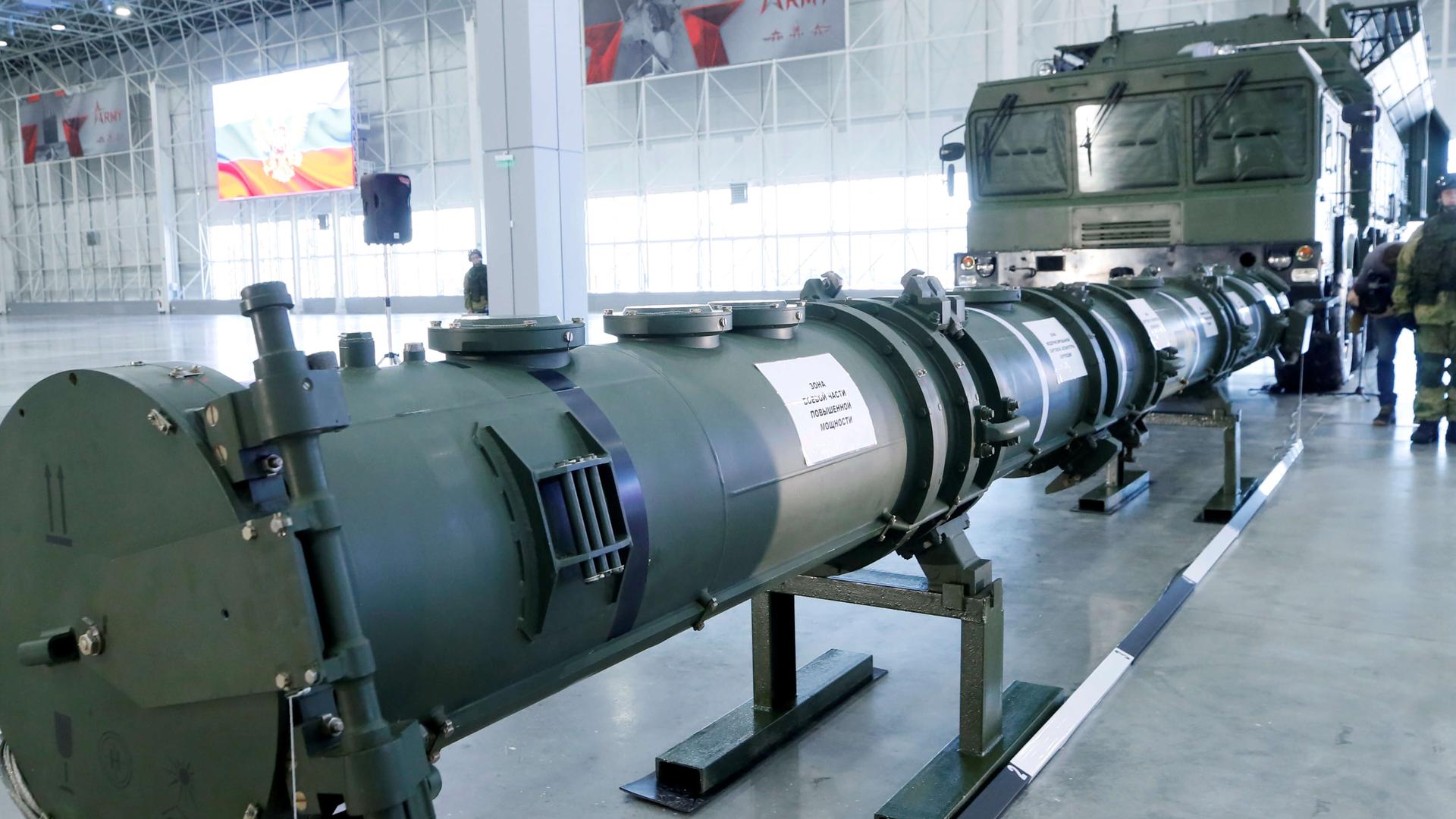Components of SSC-8/9M729 cruise missile system are on display during a news briefing, organized by Russian defense and foreign ministries, at Patriot Expocentre near Moscow, Russia, Jan. 23, 2019.
The United States will suspend compliance with the Intermediate-range Nuclear Forces Treaty with Russia on Saturday and formally withdraw in six months if Moscow does not end its alleged treaty violations, Secretary of State Mike Pompeo said on Friday.
The United States would reconsider its withdrawal if Russia, which denies violating the landmark 1987 arms control pact, came into compliance with the treaty, which bans both nations from stationing short- and intermediate-range, land-based missiles in Europe.
Related: How Trump’s exit from a Cold War-era treaty could trigger a 3-way arms race
“Russia has refused to take any steps to return (to) real and verifiable compliance,” Pompeo told reporters at the State Department. “We will provide Russia and the other treaty parties with formal notice that the United States is withdrawing from the INF treaty, effective in six months.
“If Russia does not return to full and verifiable compliance with the treaty within this six-month period by verifiably destroying its INF-violating missiles, their launchers, and associated equipment, the treaty will terminate.”
“If Russia does not return to full and verifiable compliance with the treaty within this six-month period by verifiably destroying its INF-violating missiles, their launchers, and associated equipment, the treaty will terminate.”
Some experts believe the collapse of the INF treaty could undermine other arms control agreements and speed erosion of the global system designed to block the spread of nuclear arms.
The United States alleges a new Russian cruise missile violates the pact. The missile, the Novator 9M729, is known as the SSC-8 by the North Atlantic Treaty Organization.
Related: Putin says Russia will make banned missiles if US exits arms treaty
The treaty required the parties to destroy ground-launched ballistic and cruise missiles with ranges of between 310 to 3,420 miles. Last week, the head of Russia’s military’s missile and artillery forces said the new missile’s maximum range fell short of the treaty’s lower limit.
Russia says the missile’s range puts it outside the treaty and has accused the United States of inventing a false pretext to exit a treaty that it wants to leave anyway so it can develop new missiles. Russia also has rejected a US demand to destroy the new missile.
“America really wants to develop new weapons systems which are in breach of this treaty,” Konstantin Kosachyov, a senior Russian lawmaker wrote on social media, saying the alleged Russian violation of the treaty had been a convenient pretext.
European officials are especially worried that collapse of the treaty would again make Europe an arena for nuclear-armed, intermediate-range missile buildups by the United States and Russia.
NATO support
A few hours before Pompeo’s announcement, the NATO Western security alliance issued a statement saying it would “fully support” the US withdrawal notice.
Speaking before Pompeo’s announcement, German Chancellor Angela Merkel emphasized the importance of using the six months window to keep talking.
Formal US withdrawal could give the Pentagon new options to counter Chinese missile advances but experts warn the ensuing arms race could greatly escalate tensions in the Asia-Pacific.
The United States will notify Russia on Saturday of its plan to pull out in six months, a senior US official told reporters, describing this as “one final chance” to comply with the agreement but saying Washington doubted Moscow would do so.
The official said the administration had begun to deliberate whether to extend the “New Start” arms control treaty, which went into effect in 2011 and required both nations to cut their deployed strategic nuclear warheads to no more than 1,550, the lowest level in decades.
That treaty, which also limits deployed land- and submarine-based missiles and nuclear-capable bombers, expires in February 2021, can be extended by five years if both sides agree.
US President Donald Trump’s presidency has been dogged from its inception by allegations — which Moscow denies — that Russia interfered in the 2016 US election to help his candidacy. US-Russia frictions are at their worst since the Cold War ended in 1991 despite Trump’s desire for better ties.
In a statement issued on Friday, Trump suggested ties could improve markedly if Russia were willing to compromise on arms control, saying all sides must live up to such agreements.
Related: Gorbachev: ‘A new arms race has been announced’
“We stand ready to engage with Russia on arms control negotiations … and, importantly, once that is done, develop, perhaps for the first time ever, an outstanding relationship on economic, trade, political, and military levels,” he said.
Senator Bob Menendez, the senior Democrat on the Senate Foreign Relations Committee, accused Trump of failing to grasp the importance of arms control treaties or of having a wider strategy to control the spread of nuclear weapons.
“Today’s withdrawal is yet another geo-strategic gift to [Russian President] Vladimir Putin,” he said in a statement.
Our coverage reaches millions each week, but only a small fraction of listeners contribute to sustain our program. We still need 224 more people to donate $100 or $10/monthly to unlock our $67,000 match. Will you help us get there today?
